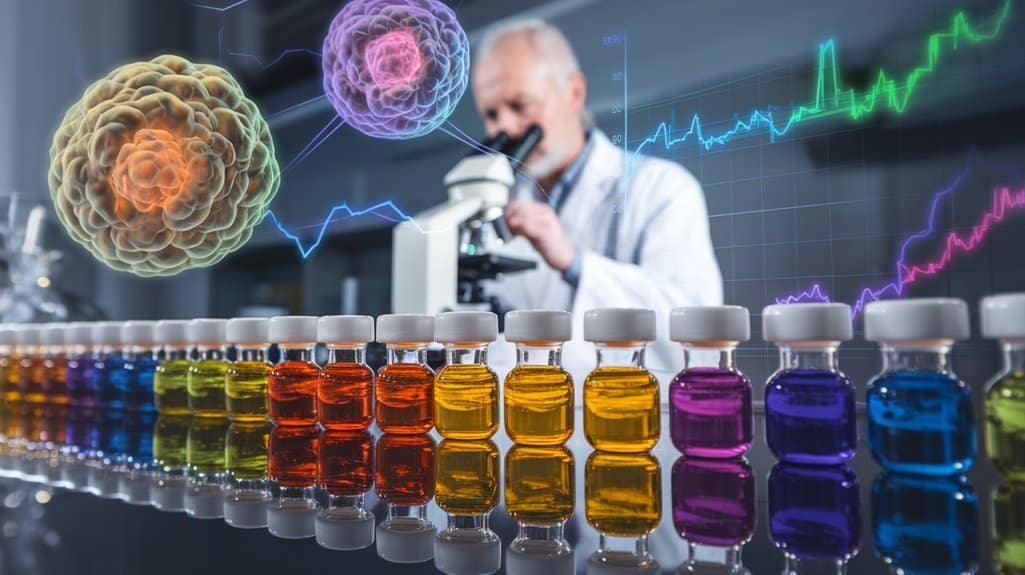Peptide hormones, composed of amino acid chains, are essential for regulating metabolic and cellular functions in your body. They bind to specific receptors, activating signaling pathways that influence growth, metabolism, and gene expression. As you age, the production of key peptide hormones, like growth hormone, greatly declines, impacting muscle strength, cognitive function, and overall health. Hormonal shifts during menopause and andropause further disrupt balance, increasing risks for chronic diseases. Understanding these hormones' roles can illuminate how aging affects you, and their therapeutic potential might offer solutions for health challenges you face as you grow older.
Key Takeaways
- Peptide hormones are amino acid chains that regulate various bodily functions and are synthesized as preprohormones in cells.
- Common examples include insulin, oxytocin, and growth hormone, each serving unique physiological roles.
- Aging leads to a decline in peptide hormones like growth hormone and sex hormones, impacting muscle mass and overall health.
- Hormonal changes during aging can result in increased body fat, reduced muscle strength, and heightened risk of chronic diseases.
- Understanding peptide hormones and their aging effects can inform therapeutic approaches to improve health and quality of life in older adults.
Definition of Peptide Hormones

Peptide hormones play an essential role in regulating many physiological processes within the body. These hormones are primarily composed of amino acid chains linked by peptide bonds and can vary considerably in size, spanning from small molecules like oxytocin to larger hormones such as insulin.
Unlike steroid hormones, peptide hormones lack carbon-based rings, which helps in their classification into categories such as glycoprotein hormones, short polypeptide hormones, and small protein hormones.
Peptide hormone synthesis occurs as preprohormones in the rough endoplasmic reticulum, where ribosomes translate mRNA transcripts into long polypeptide chains. These preprohormones then convert into inactive prohormones, undergoing further modifications in the Golgi apparatus to yield the active peptide hormones that your body requires.
This processing often involves removing unnecessary amino acid residues, guaranteeing proper folding for functionality. As part of their synthesis and processing, prohormones undergo specific modifications that play a critical role in their eventual biological activity.
Once matured, peptide hormones invoke effects important to energy metabolism, cell growth, and diverse bodily functions. Their hydrophilic nature guarantees they circulate freely in the bloodstream, reaching specific receptors on target cells to exert their physiological effects.
Understanding peptide hormone classification and synthesis is essential when exploring their role in health and aging.
Mechanism of Action
Peptide hormones exert their effects by first binding to specific receptors on target cells, triggering a cascade of intracellular events. This binding activates second messengers, which amplify the signal and lead to various cellular responses, ultimately influencing metabolic and proliferative pathways. The entire process begins with the synthesis, processing, and release of these hormones, ensuring they reach their intended targets effectively. Additionally, peptide hormones utilize G-protein coupled receptors (GPCRs) for signaling, which is crucial for their physiological functions.
Binding to Cell Receptors
Binding specificity is essential in the interaction between hormones and their target cells, as it dictates the resulting biological responses. Peptide hormones bind to specific receptors located on the cell surface, which are integral membrane proteins comprised of an extracellular domain, a transmembrane domain, and a cytoplasmic domain. The interaction highlights receptor specificity, enabling selective recognition of hormone molecules, leading to conformational changes in the receptor structure.
Once bound, the receptor-hormone complex undergoes endocytosis, internalizing into the endosomal system. This internalization not only extends the biological signals initiated at the cell surface but also subjects the receptors to endosomal regulation. Within this system, changes in vacuolar pH and dephosphorylation by receptor kinases modulate receptor activity, while ubiquitination-deubiquitination cycles govern receptor trafficking. Additionally, receptor-mediated endocytosis plays a crucial role in degrading peptide ligands, ensuring proper signal termination.
Consequently, activated receptors encounter various substrates, facilitating diverse cellular actions such as altering gene expression and directing metabolic pathways. This intricate mechanism underscores the importance of receptor specificity and endosomal dynamics in fine-tuning the physiological effects of peptide hormones.
These insights provide potential therapeutic interventions targeting these pathways to combat aging-related dysfunctions.
Second Messenger Activation
Upon activation, a remarkable cascade of events unfolds within the cell that underpins the mechanism of action for peptide hormone signaling. The binding of peptide hormones to their specific receptors induces a conformational shift, activating the G protein. This process involves the exchange of GDP for GTP on the G protein's α subunit, leading to the dissociation of the G protein into α and βγ subunits.
The α subunit subsequently activates key enzymes like adenylyl cyclase and phospholipase C, essential components of second messenger pathways. Adenylyl cyclase catalyzes the conversion of ATP to cyclic AMP (cAMP), while phospholipase C hydrolyzes PIP2 to yield diacylglycerol (DAG) and inositol-1,4,5-triphosphate (IP3).
These second messengers, cAMP and Ca²⁺, play critical roles in intracellular signaling cascades. cAMP activates protein kinase A (PKA), while IP3 triggers calcium release from the endoplasmic reticulum. The subsequent activation of PKC by DAG contributes to diverse cellular responses, including alterations in gene expression, metabolism, and cell growth, culminating in a coordinated response to the initial signal.
Hormone Processing and Release
The intricate mechanisms governing hormone processing and release are vital for understanding peptide hormone function within the body. Initially synthesized in the rough endoplasmic reticulum as preprohormones, these proteins contain a signal peptide that facilitates their entry into the ER. Once in the ER lumen, the signal peptide is cleaved, leading to the formation of prohormones. These undergo further processing and folding, subsequently transported in vesicles through the Golgi apparatus, where enzymatic cleavage transforms them into active hormones.
Following processing, the vesicle trafficking system comes into play. Vesicles are formed at the trans-Golgi network and transported along microtubules, eventually tethering near the plasma membrane. Upon stimulation, these docked vesicles undergo exocytosis, releasing their contents into the extracellular environment.
This mechanism is important: peptide hormones, being hydrophilic, can't diffuse through cell membranes freely. Hormonal dysregulation can arise if any step in hormone processing or vesicle release is disrupted, affecting physiological homeostasis.
Understanding this complexity enhances your insight into how peptide hormones influence aging and overall health, emphasizing the fundamental nature of proper hormone processing and release.
Key Examples of Peptide Hormones

In understanding the role of peptide hormones in your body, consider insulin, which plays an important role in regulating metabolism and blood sugar levels.
Additionally, growth hormone greatly impacts aging by influencing muscle mass and regeneration, essential for maintaining health as you age.
Oxytocin, often termed the "bonding hormone," also merits attention for its profound effects on social behavior and emotional connection throughout life.
Insulin's Role in Metabolism
Insulin plays an essential role in regulating metabolism, directly impacting how your body utilizes glucose, proteins, and fats. Its functions are fundamental for maintaining glucose homeostasis and preventing insulin resistance.
Here's a closer look at insulin's key roles:
- Glucose Regulation: Insulin facilitates glucose absorption into the liver, fat, and skeletal muscle, markedly lowering blood sugar levels.
- Protein Synthesis: It accelerates protein formation, influencing synthesis and degradation in various tissues, ensuring cellular health and function.
- Fat Metabolism: By promoting lipogenesis, insulin converts excess glucose into triglycerides, inhibits fat breakdown, and regulates fat storage in adipose tissue.
- Signal Transduction: Insulin binds to receptors, triggering a cascade that enhances GLUT4 transporter insertion into cell membranes, critical for glucose uptake.
These mechanisms underscore insulin's significance in metabolic pathways.
When insulin resistance develops, these processes become impaired, leading to metabolic syndrome and other health issues.
Hence, understanding insulin's multifaceted role in metabolism provides insight into maintaining overall health and mitigating the effects of aging.
Growth Hormone and Aging
As individuals age, the body's hormonal landscape changes considerably, with growth hormone (GH) experiencing a notable decline. This reduction typically begins in middle age and corresponds with various aging effects. You might notice decreased muscle strength, lean body mass, and an increase in body fat as your GH levels drop.
Additionally, diminished GH can impair cognitive function and lead to a decrease in deep sleep, impacting memory and overall mental agility.
While there are claims promoting GH supplementation as an anti-aging strategy, the scientific evidence lacks robust support for these assertions. Therapy can alleviate symptoms in individuals with diagnosed GH deficiencies, but it comes with potential side effects, including fluid retention and elevated blood glucose.
Significantly, higher GH levels in older adults pose health risks, such as an increased likelihood of aggressive cancers.
Exploring alternatives, peptide therapies like Sermorelin and CJC-1295 can boost natural GH production without the significant drawbacks associated with GH therapy. These alternatives may help mitigate symptoms related to aging, such as high body fat and decreased muscle strength, offering a safer avenue for enhancing wellness.
Nonetheless, a thorough evaluation of risks and benefits is essential.
Oxytocin's Social Functions
Oxytocin serves as a significant hormone in regulating social interactions, influencing behaviors that enhance bonding and empathy among individuals. Its role is essential in forming and maintaining social relationships, particularly in contexts involving trust and emotional attachment.
Here are four key social functions of oxytocin:
- Facilitates Trust: Oxytocin enhances your ability to trust others, thereby fostering deeper connections.
- Promotes Bonding: It plays a notable role in parent-child attachment and romantic partnerships, leading to stable relationships.
- Regulates Social Behavior: Research shows oxytocin release impacts social cognition and reduces social anxiety by modulating responses in the amygdala and prefrontal cortex.
- Encourages Social Approach: While it promotes positive social interactions, oxytocin can also heighten experiences of envy and jealousy in competitive settings.
Understanding these functions helps explain oxytocin's complex role in human social dynamics.
Whether you're maneuvering through friendships or grappling with social anxiety, recognizing oxytocin's involvement can illuminate pathways for improving social engagement.
Its therapeutic potential for social anxiety disorders further emphasizes the need for ongoing research to harness its effects effectively in clinical settings.
Aging and Hormone Production
Hormone production greatly declines as you age, with various hormonal changes impacting overall health. For women, menopause marks a dramatic reduction in estrogen and progesterone, disrupting hormonal balance.
Men experience andropause, where testosterone levels gradually decline starting in their 20s or 30s, which can lead to metabolic disorders like increased fat mass and decreased muscle strength. Growth hormone levels also diminish, affecting body composition and metabolism, contributing to a higher risk of chronic conditions such as diabetes and cardiovascular disease.
Moreover, the decline of dehydroepiandrosterone (DHEA) and its sulfate counterpart (DHEA-S) after peak levels in early adulthood reduces the synthesis of other hormones, which can further exacerbate metabolic dysfunction.
Additionally, increased levels of sex hormone-binding globulin (SHBG) in older adults lower the bioavailability of testosterone, intensifying the risk of metabolic disorders.
These age-related hormonal changes highlight the necessity for interventions like hormone replacement therapy or lifestyle modifications to restore hormonal balance and mitigate health risks.
Understanding these dynamics is critical in addressing the myriad health consequences associated with aging and hormonal decline.
Impacts on Brain and Body

Throughout aging, peptide hormones exert considerable influences on both the brain and the body, impacting various physiological processes. Their roles in neurotransmitter interaction and hormonal signaling are pivotal to understanding these effects.
- Neurotransmission Modification: Peptides function as neurotransmitters or neuromodulators, greatly influencing dopaminergic transmission.
- Behavioral Regulation: Hormones like cholecystokinin affect both satiety and maternal behaviors through their interactions with amphetamine and apomorphine.
- Age-Related Decline: Aging leads to reduced responsiveness of hypothalamic peptide hormones, resulting in diminished receptor sensitivity and altered neurotransmitter function, particularly impacting conditions like Alzheimer's disease.
- Broad Distribution: Peptide hormones and their receptors are widely distributed across the brain, affecting energy balance and feeding behavior, thereby influencing various physiological functions.
As you navigate the aging process, the complex interplay between peptide hormones and their influence on brain function highlights the importance of understanding these biochemical signals.
Acknowledging these impacts is essential for mastering the broader implications for mental and physical health throughout aging.
Benefits of Peptide Therapy
As the effects of aging on the brain and body become more pronounced, many individuals seek effective ways to address both physical and cognitive declines. Peptide therapy benefits encompass a variety of areas, prominently including muscle mass enhancement and improved recovery. By stimulating the production of human growth hormone, peptides like CJC-1295 and Ipamorelin facilitate muscle growth, strength, and overall health.
In addition to promoting muscle mass, certain peptides can reduce joint and muscle pain through cellular regeneration and inflammation reduction. This not only enhances physical performance but may also improve your quality of life.
Peptide therapy can also aid your weight management efforts by increasing metabolism and encouraging fat breakdown, making it easier to achieve your fitness goals. Moreover, peptides bolster sleep quality. For example, DSIP is known to help individuals fall asleep faster, which is essential for recovery and cognitive function.
With boosts in energy and stamina, peptide therapy becomes a multifaceted solution for aging individuals.
Clinical Applications of Peptides

Peptide therapy plays an essential role in addressing various medical conditions and enhancing overall health outcomes. By harnessing the specific actions of peptides, healthcare providers can improve treatment efficacy for a range of conditions.
Here are four key clinical applications of peptide therapies:
- Hormone Deficiencies: Peptide therapies, like growth hormones, are vital in treating growth deficiencies, promoting muscle mass, and aiding in insulin regulation for diabetes management.
- Chronic Pain Management: Peptides such as substance P and vasoactive intestinal peptide (VIP) help reduce chronic pain and inflammation, offering relief for those suffering from persistent conditions.
- Oncologic Applications: Synthetic peptides can serve as imaging probes in tumor detection and can possess therapeutic properties to target and inhibit cancer cell growth, minimizing toxicity.
- Regenerative Medicine: Peptides play a major role in tissue repair, wound healing, and managing skin health by promoting cellular functions and reducing inflammation.
These clinical applications demonstrate how peptide therapies can be powerful tools in modern medicine, providing tailored solutions to complex health issues and advancing patient care.
Frequently Asked Questions
How Are Peptide Hormones Different From Steroid Hormones?
Peptide hormones differ from steroid hormones primarily in their synthesis and action. While peptide synthesis occurs from amino acids, they bind to hormone receptors on the cell surface, triggering rapid cellular responses, unlike the slower steroid mechanisms.
Are Peptide Hormones Safe for Long-Term Use?
When considering long-term efficacy, peptide hormones present potential risks, including hormonal imbalances and organ damage. You should consult a qualified healthcare provider to assess safety and minimize adverse effects associated with prolonged use.
How Can I Measure My Peptide Hormone Levels?
You can measure your peptide hormone levels through home testing kits or by requesting blood analysis via a healthcare provider. Each method offers specific insights, but make certain sample handling aligns with analytical requirements for accuracy.
What Lifestyle Changes Can Improve Peptide Hormone Production?
You'd think lifestyle changes wouldn't matter much, but dietary modifications and tailored exercise routines greatly enhance peptide hormone production. Focus on whole foods and regular workouts for ideal hormonal health and balance.
Do Peptide Hormones Have Side Effects?
Yes, peptide therapy can cause side effects, including hormonal imbalances that disrupt hormonal balance, cardiovascular issues, and psychological changes. Awareness of these potential effects is essential for informed decision-making regarding peptide treatments in your health regimen.
Conclusion
In understanding peptide hormones and their aging effects, think of your body's hormonal balance like a well-tuned orchestra. As we age, some instruments may go out of tune, leading to discordant health effects. Research indicates that peptide therapy can help restore harmony, enhancing liveliness and cognitive function. Just as a conductor revitalizes a symphony, peptide therapy can rejuvenate our systems, helping you regain the rhythm of life amidst the complexities of aging.




